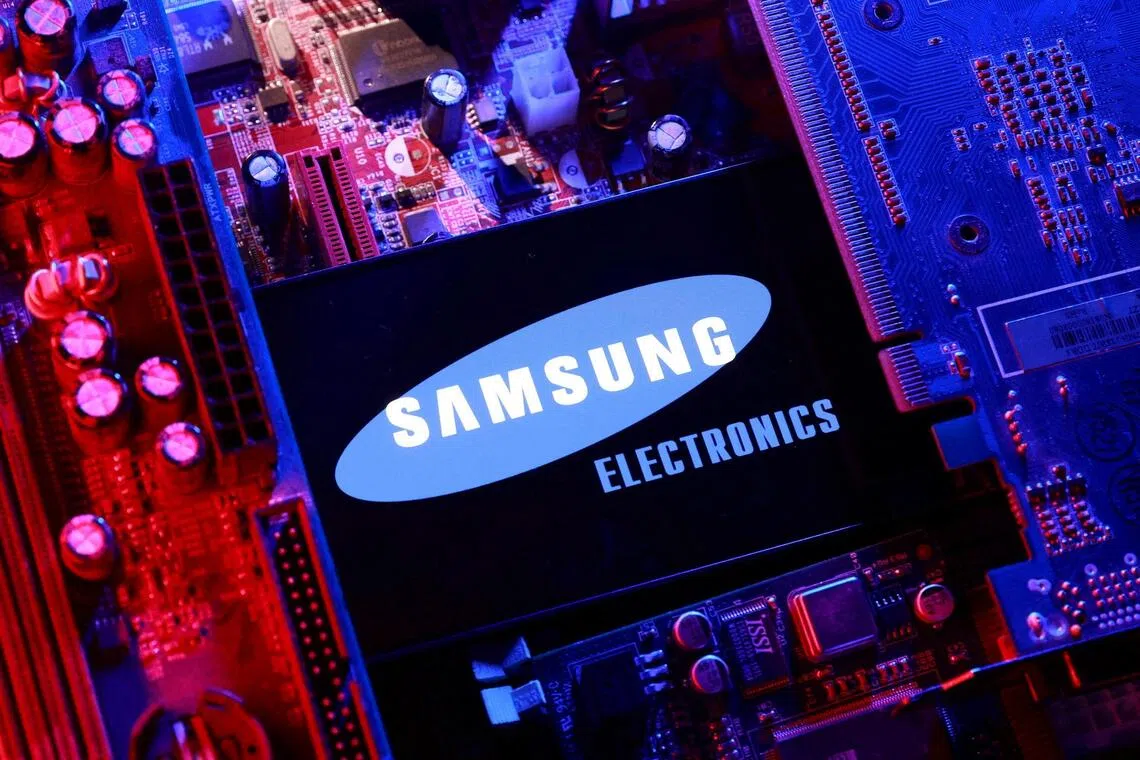Samsung’s shares wobble after failing to wow AI-manic investors
Sign up now: Get ST's newsletters delivered to your inbox

Samsung Electronics reported its biggest quarterly profit in more than three years in a sign of healthy artificial intelligence chip demand.
PHOTO: REUTERS
Follow topic:
SEOUL – Samsung Electronics reported its biggest quarterly profit in more than three years in a sign of healthy artificial intelligence (AI) chip demand, though investors hoping for outsized numbers cashed in some of the company’s recent stock market gains.
Its shares slid as much as 2.1 per cent in Seoul, reversing strong early advances. That was after Samsung reported a better-than-projected 32 per cent rise in operating income to 12.1 trillion won (S$11 billion) for the July to September quarter, while revenue rose about 9 per cent.
The tepid market reaction reflects, in part, lofty expectations for the global leader in memory, a fundamental component of Nvidia accelerators and data centres. South Korea’s largest company has gained more than 60 per cent of market value since June, buoyed by signs of recovery in its pivotal semiconductor division.
Samsung’s recent run-up underscores confidence in the durability of demand for AI servers and chips as tech companies scramble to build and amass computing power.
It suggests that investors are betting on the company’s chances of regaining ground in the high-bandwidth memory segment, which was lost to SK Hynix following years of setbacks.
The company will provide a full financial statement with net income and divisional breakdowns on Oct 30.
Like much of the tech sector, Samsung seeks to ride an anticipated AI boom in the coming years. It has made progress with its latest HBM chips, securing an order from Advanced Micro Devices while awaiting final approval on HBM3E chips from market leader Nvidia.
“Samsung’s operating profit was much bigger than anyone was expecting,” said Mr Sanjeev Rana, head of research at CLSA Securities Korea.
“Its high-bandwidth memory shipments have recovered, rising 70 per cent to 80 per cent from the previous quarter, and there is a possibility that the size of the write-downs in the foundry business was much smaller than expected.”
Earlier in October, both Samsung and SK Hynix struck agreements to supply chips to OpenAI’s Stargate project. Their projection for demand represented more than twice the current global capacity of HBM, underscoring the enormity of Stargate and accelerating global AI development.
That, together with rising memory chip prices, has prompted dozens of analysts to lift their price targets for Samsung recently.
Samsung may have reclaimed its spot as the top memory chipmaker in terms of revenue after AI-related investments bolstered prices and sales volumes of general-purpose Dram and Nand, said Mr M.S. Hwang, research director at Counterpoint.
But the volume impact of its HBM3E shipments to Nvidia remains limited, he cautioned.
“To regain its previous market leadership, Samsung needs to carry this momentum into its next-generation product, HBM4,” he said. BLOOMBERG

